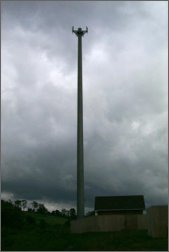What are the Dangers of Living Near Cell Phone Towers?
by www.SixWise.com
Over 190 million cell phones are in use in the United States,
with users often scrambling to another room, building or street
to get better reception. As consumers, it is frustrating when
your cell phone reception gets dropped or is too garbled to
hear. But beyond "Can you hear me now?" is another
considerably more important question:
Are the cell towers and antennas popping up all over the
country - -the very ones that we depend on for clear reception
and a wide coverage area -- safe?
|

Health, not aesthetics, is the primary reason why residents
oppose cell phone towers in their towns.
|
This may have been a moot issue in the past when the towers
were sparse and limited to obscure cornfields and hilltops.
But the number of these cell "sites," as they're
called, has increased tenfold since 1994. Among the more than
175,000 cell sites in the United States are antennas on schools,
churches, firehouses, cemeteries and national parks. There's
even a cell tower near Old Faithful in Yellowstone.
"Don't Put That Tower Here"
"Our companies are always running into this conundrum,
which is, 'We want cell phone service, but don't put that
tower here.' When you're dealing with communications through
the air, you have to have antennas and towers," said
Joe Farren, a spokesman for CTIA-The Wireless Association,
the industry's trade group.
Aesthetics aside, the primary reason most people don't want
cell sites near their homes and communities is because they're
afraid of the potential health effects.
Already, more than 500 cases have sprung up across the country
in which people have tried to stop cell phone sites from being
constructed, according to Washington attorney Ed Donohue,
who represents several cell phone companies.
Most of the time, the cell phone companies win because, as
it stands, federal law does not allow rejection of a tower
based on health risks.
Cell Phone Towers: Risky or Not?
If you ask the government, no studies have shown conclusive
evidence that radio-frequency emissions, a form of electromagnetic
radiation (EMR), from cell towers are harmful.
According to the Food and Drug Administration:
"RF [Radio frequency] exposure on the ground is much
less than exposure very close to the antenna and in the
path of the transmitted radio signal. In fact, ground-level
exposure from such antennas is typically thousands of times
less than the exposure levels recommended as safe by expert
organizations. So exposure to nearby residents would be
well within safety margins."
Cell phone companies also maintain that no risks exist from
the towers. "There are no health risks posed by the towers.
Independent scientific panels around the world have reached
this conclusion," said Russ Stromberg, senior manager
of development at T-Mobile.
|

The government and cell phone companies maintain cell
towers (and phones) are safe.
|
But other studies seem to tell a different story, with findings
such as:
-
A study by Dr. Bruce Hocking in Australia found that
children living near three TV and FM broadcast towers
(similar to cell towers) in Sydney had more than twice
the rate of leukemia than children living more than seven
miles away.
-
Says Dr. Neil Cherry, a biophysicist at Lincoln University
in New Zealand:
-
"Public health surveys of people living in the
vicinity of cell site base stations should be being
carried out now, and continue progressively over the
next two decades. This is because prompt effects such
as miscarriage, cardiac disruption, sleep disturbance
and chronic fatigue could well be early indicators
of the adverse health effects. Symptoms of reduced
immune system competence, cardiac problems, especially
of the arrhythmic type, and cancers, especially brain
tumor and leukemia, are probable."
-
Biomedical engineer Mariana Alves-Pereira says exposure
to cell phone towers can lead to vibroacoustic disease.
"From what I understand, some of the complaints are
similar in what is seen in vibroacoustic disease patients,
which are people who develop a disease caused by low frequency
noise exposure," she said. Symptoms can include mood
swings, indigestion, ulcers and joint pain.
-
Dr. Gerard Hyland, a physicist who was nominated twice
for the Nobel Prize in medicine, says, "Existing
safety guidelines for cell phone towers are completely
inadequate ... Quite justifiably, the public remains
skeptical of attempts by governments and industry to reassure
them that all is well, particularly given the unethical
way in which they often operate symbiotically so as to
promote their own vested interests."
-
According to the Mount Shasta Bioregional Ecology Center,
"Studies have shown that even at low levels of this
radiation, there is evidence of damage to cell tissue
and DNA, and it has been linked to brain tumors, cancer,
suppressed immune function, depression, miscarriage, Alzheimer's
disease, and numerous other serious illnesses."
-
According to Dr. W. Löscher of the Institute of
Pharmacology, Toxicology and Pharmacy of the Veterinary
School of Hannover in Germany, dairy cows that were kept
in close proximity to a TV and cell phone tower for two
years had a reduction in milk production along with increased
health problems and behavioral abnormalities. In an experiment,
one cow with abnormal behavior was taken away from the
antenna and the behavior subsided within five days. When
the cow was brought back near the antenna, the symptoms
returned.
Incentives for Cell Phone Towers
Why would a church, school or other private property allow
a cell phone antenna to be placed on the grounds? Cell phone
companies pay "rent" for their placement that can
range anywhere from $800 to $2,000 a month. This can mean
all the difference for an under-funded school district or
church.
Still, many people are wary that the incentives do not come
close to matching the potential risk involved. This includes
the International Association of Fire Fighters who, in 2004,
came out against the use of firehouses for cell antennas "until
a study with the highest scientific merit" can prove
they are safe.
These sentiments are echoed by residents of St. Louis where
T-Mobile plans to put a cell site on an 89-year-old church.
"That revenue is in exchange for our potential well-being,
our peace of mind and our property values," said resident
David O'Brien. "None of us are willing to take that risk."
Recommended Reading
Noise
Pollution: How Bad is it, How Bad Could it Get, What are the
Effects?
Bottled
Water: Which City's Tap Water System is Making a Flood of
Cash off of You?
Sources
Food
and Drug Administration: Cell Phone Facts
Health
Effects Associated With Mobile Base Stations in Communities
Are
Cell Phone Towers Making You Sick?
Mount
Shasta Bioregional Ecology Center
Wired
News: Cell Phone Tower Debate Grows
Extraordinary
Behaviors in Cows in Proximity to Transmission Towers